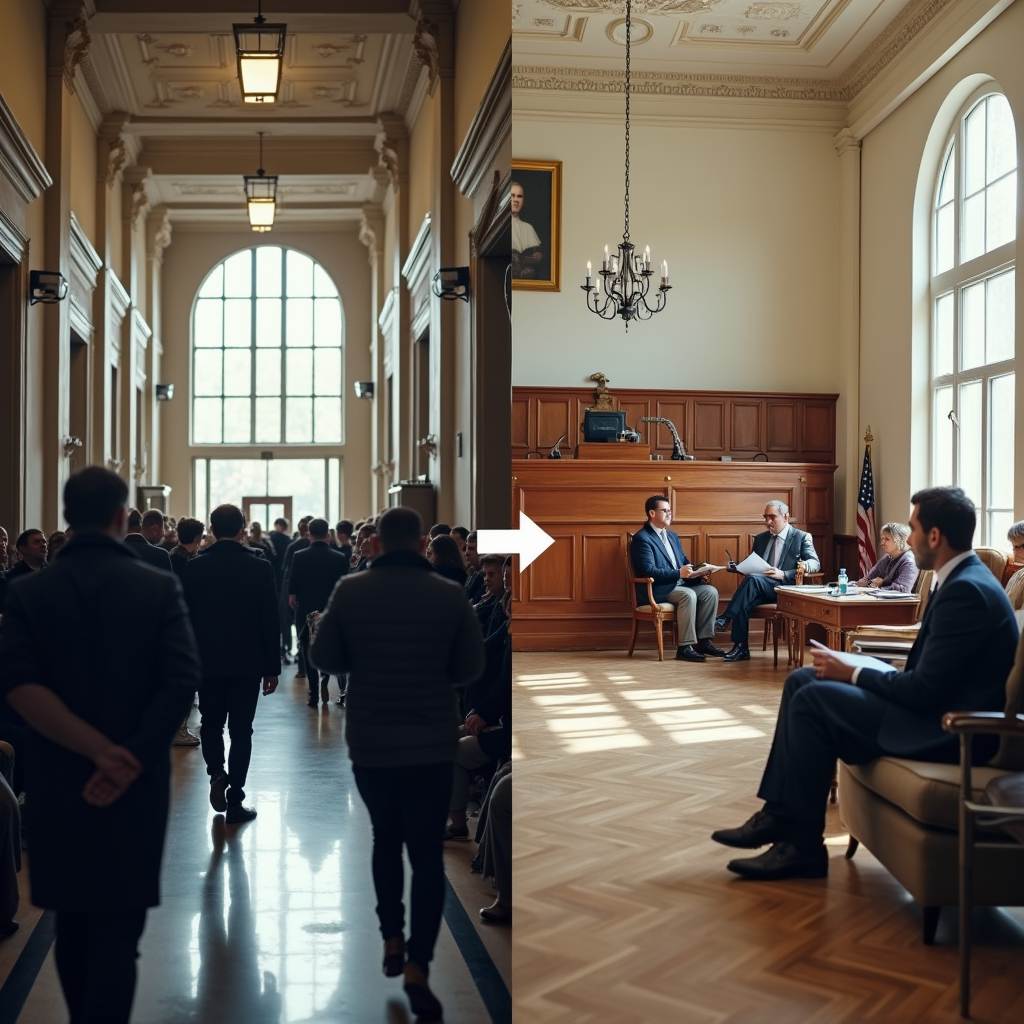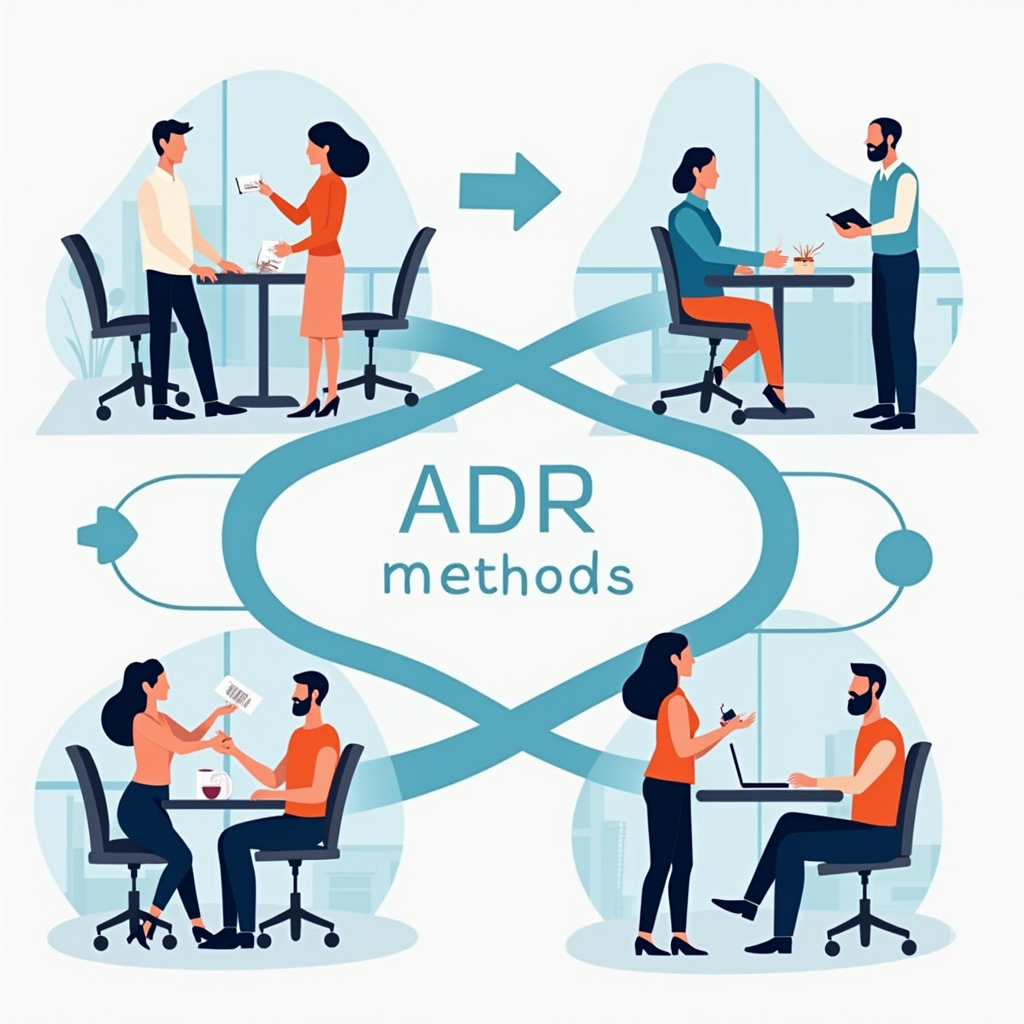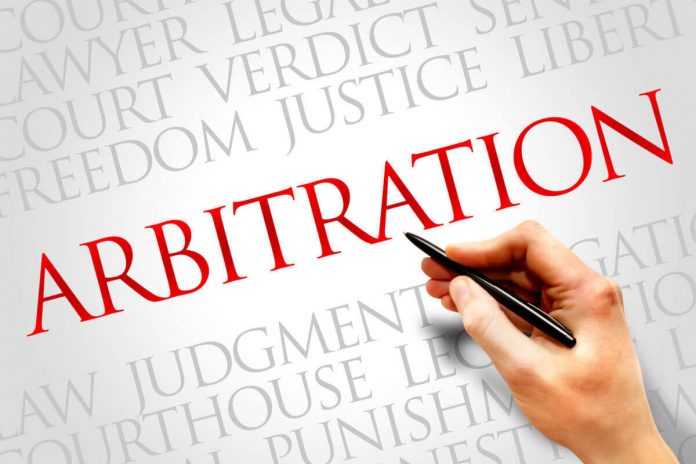This article is written by Adhila Muhammed Arif and further updated by Shreya Patel. This article seeks to elucidate upon Section 11 of the Arbitration and Conciliation Act, 1996, the amendments throughout the years, the appointment of arbitrators, and the scope of judicial intervention in the matter of appointment of arbitrators.
Table of Contents
Introduction
The methods through which a dispute can be solved among the parties without moving to a court are alternative dispute resolution methods. The alternative dispute resolutions are negotiation, arbitration, mediation, lok adalat, and conciliation. The key motive behind using these multiple modes of alternative dispute resolution is to decrease the workload of the judiciary in India and help the parties resolve disputes faster. The concept of arbitration is not new in India. The practice of arbitration to resolve disputes between parties can be traced back to Brihadaranyaka Upanishad. As per the Hindu law, one of the oldest and first mentions of arbitration is in Brihadaranyaka Upanishad.
Section 11 of the Arbitration and Conciliation Act, 1996 (hereinafter referred to as ‘the Act’), deals with the provision of appointment of arbitrators in an arbitration settlement. The Act provides for different procedures through which the appointment of arbitrators can be done. Section 11 allows the parties to choose arbitrators by agreeing upon a procedure for appointment. In case the parties cannot appoint arbitrators by themselves, they can get arbitrators appointed through the procedures prescribed in Section 11. Over the years, the Section has gone through several changes via amendments in the years Arbitration and Conciliation (Amendment) Act, 2015, and Arbitration and Conciliation (Amendment) Act, 2019, substantially reducing the influence of the judiciary in arbitration.
In this article, we will discuss the provisions of Section 11 of the Act along with the landmark judgments passed in relation to the same. The article also discusses how many arbitrators are required to be appointed, what the fees for the appointed arbitrators are, what steps are to be taken in case the appointment of the arbitration is not done, how much can a court interfere in the matter of arbitration and its award along with other key information.
Meaning of arbitration
Arbitration is essentially one of the methods of alternative dispute resolution (ADR) whereby a dispute between two parties is heard and determined by a third party without involving the court. It allows parties to seek an expeditious settlement of disputes like that of litigation. However, unlike litigation, it takes place outside the court and the decision is final and cannot be challenged. It results in the declaration of an award similar to an order given by the court. Matters concerning arbitration are governed by the Act.
The World Intellectual Property Organization (WIPO) defines arbitration as –
“Arbitration is a process in which parties by an agreement submit the dispute to one or more arbitrators, who then make a decision binding to the parties on the dispute. Arbitration is a method of resolving disputes by way of private dispute resolution, instead of going to a court”.
Section 2(1)(a) states that arbitration means any arbitration administered or not administered by a permanent arbitral institution.
Parties choose an arbitration method to resolve their disputes, as it provides more flexibility and efficiency as compared to the litigation method. The process of arbitration begins with drafting an arbitration agreement between the parties. This arbitration agreement is referred to when any dispute arises between the parties. All the important terms and conditions are mentioned in this agreement. There can be cases wherein an agreement is not present and the parties decide to resolve a dispute by choosing the method of arbitration after the dispute has arisen. In such cases Section 11 of the Act lays down the provisions that are to be followed when it comes to appointing an arbitrator.
Let’s look into the different provisions mentioned under Section 11.
Provisions under Section 11 of the Arbitration and Conciliation Act

Sub-section 1
The arbitrator can be of any nationality unless something specific is agreed by the parties. There is no restriction on the arbitrator’s nationality if both the parties to the dispute agree to the same. The key point to keep in mind here is that an arbitrator is appointed only after there has been a mutual agreement between the parties to the dispute. This sub-section also mentions that the nationality of the arbitrator may also be priorly mentioned in the agreement, For example, in case of disputes between two companies that work in different countries, they can have a clause in the agreement that states that they shall appoint an arbitrator from a specific nationality in case of dispute. There is no strict rule that the arbitrator has to be a citizen of India if the arbitration is taking place in India.
Sub-section 2
The parties can freely decide the process for arbitrator or arbitrator’s appointment, subject to sub-section (6) of the Section. The parties themselves decide the procedure for arbitration and appointment of the arbitration. The parties are free to follow whichever method they want which is comfortable for both the parties and also ensures the resolution of the dispute.
The parties are free to decide the place of arbitration, the language in which the arbitration is to be carried out, how they want to appoint the arbitrator, what procedure they want to follow when the arbitration proceedings take place, etc. These details are also often added to the agreement itself. If some specific venue or process is mentioned in the agreement then that is to be followed. In the case of Bgs Sgs Soma Jv vs Nhpc Ltd. (2019) it was held that when a specific venue for the arbitration is specified in the agreement and there are no other clauses that act in contradiction to the same, then the seat for the arbitration has to be the venue which is specific.
Sub-section 3
In case of failure to reach an agreement on the procedure of appointment, sub-section (3) prescribes the following procedure for the appointment of three arbitrators:
- Each party appoints an arbitrator.
- The two arbitrators then jointly appoint the third arbitrator, who acts as the presiding arbitrator.
The main aim of this sub-section is to ensure that there is a balanced approach when it comes to appointing arbitrators. When the agreement between the parties states that three arbitrators shall be appointed then in that case each party shall appoint one arbitrator from their side, and the third arbitrator will be appointed as the presiding arbitrator by the other 2 appointed arbitrators.
In the case of Taleda Square Private Limited vs. Rail Land Development Authority (2023) the principle of impartiality and independence was pressed upon by the court. The resolution clause in this case stated that the parties have to choose and nominate the arbitrator from the list that is provided by the respondent. And for the appointment of the presiding officer, only the respondent will appoint the same. The approach used by the respondent was restrictive and also violated the approach of rights of the claimant. The court stated that this kind of clause violates the right of free choice and created partiality between the parties. Such a process of appointing the arbitrators is not valid.
Sub-section 3A
The power to designate an arbitral tribunal from time to time is vested in the Supreme Court and the High Court. These arbitral tribunals will be graded by council under the Section 43-I. Provided that if a graded arbitral tribunal is not present in the jurisdictions of any High Court, then the concerned High Court’s Chief Justice can maintain an arbitrator’s panel that discharges all the duties and functions of the arbitral institution.
When any reference is made to the arbitrators, it will be deemed that it is made to the arbitral tribunal. The arbitrators that are appointed under this Section are entitled to the fees which are prescribed in the Fourth Schedule. A review on a periodic basis is also conducted of the arbitral tribunal by the Chief Justice of the concerned High Court.
Sub-section 4
If the procedure of appointment in the sub-section (3) is applied –
- Each party must appoint an arbitrator within thirty days of receiving the request from the other party to do so.
- The two arbitrators must reach an agreement on appointing the third arbitrator within thirty days from the date of their appointment. Such appointment of an arbitrator will be made when the party makes an application for the same. In case of an international commercial matter, the Supreme Court will make the appointment of arbitrators, while in case of matters, other than international commercial matter, the High Courts will appoint.

When the parties fail to appoint the arbitrators the Supreme Court and High Court help the parties by appointing an arbitrator. The timelines are provided in order to make the process quick in order to resolve the dispute faster than the traditional courts. Both the parties are given the right to select an arbitrator in order to maintain partiality. The Supreme Court and High Court shall help the parties who have opted for arbitration when they are having problems with the appointment of the arbitrator.
Sub-section 5
This sub-section states when in an arbitration with a sole arbitrator and the parties to the dispute cannot reach an agreement on the procedure of appointment, then in that case if the arbitrator is not appointed within thirty days from the day on which one party had requested the other party to agree, then such appointment shall be made by the High Court if the arbitration is a non international commercial arbitration, while in case of international commercial arbitration the appointment of arbitrator will be done by the institution designated by the Supreme Court.
Sub-section 6
This sub-section states that where an agreement on the appointment procedure has been made by the parties, if
- A party fails to act as prescribed by the procedure, or
- The parties or the appointed arbitrators fail to reach an agreement as prescribed by the procedure, or
- The person or institution entrusted with any function by the procedure fails to perform it, then such appointment of an arbitrator will be made when the party makes an application for the same. In case of an international commercial matter, the Supreme Court will make the appointment of arbitrators, while in case of matters, other than international commercial matters, the High Courts will appoint in order to take measures that are necessary, unless there is some other means for securing appointment as per the agreement.
In the case of Brahmani River Pellets Limited vs. Kamachi Industries Limited (2019), the Supreme Court held that only the courts that satisfy the jurisdiction as per the contract will have the jurisdiction in relation to that matter. The parties to the dispute had already decided the venue for arbitration, which was Bhubaneswar. This proves that the parties intended to exclude other courts from having jurisdiction. The High Court of Madras had no jurisdiction under the Section 11(6) of the Act in relation to the appointment of the application for an arbitrator.
Sub-section 6A
This sub-section was omitted in the 2019 Amendment.
Sub-section 6B
When the Supreme Court or the High Court makes a designation of any person or institution under this Section, this will not entail the delegation of judicial powers of such High Court or Supreme Court.
Sub-section 7
This sub-section was omitted in the 2019 Amendment.
Sub-section 8
The Supreme Court, High Court, or the institution or person designated by the court before an arbitrator is appointed, must give in writing a disclosure from the prospective arbitrator in terms of Section 12(1) and make the decision taking in the following considerations
- Qualifications required for an arbitrator as per the agreement of the parties,
- Contents of disclosure and other considerations for appointing an independent and impartial arbitrator
Sub-section 9
In case of appointment for arbitrator is to be made in international commercial matters, and there is a need to appoint a sole arbitrator or a third arbitrator, the arbitral institution designated by the Supreme Court or a High Court may appoint an arbitrator of a nationality other than the nationalities of the parties.
This sub-section governs that in case of the international commercial arbitration, the party can approach the Supreme Court for the arbitrator appointment. In the case of international commercial arbitration, the person or the institution which is designated by the court or the Supreme Court may appoint a third arbitrator or a sole arbitrator. The arbitrator that is to be appointed must be of any other nationality than the parties’ nationality.
In the case of M/S Comed Chemicals Ltd. vs. CN Ramchand (2008) a petition was filed by the petitioner under Section 11. The petitioner has prayed to the Chief Justice of India to appoint a presiding arbitrator or a sole arbitrator. The preferred arbitrator was mentioned and the same was conveyed by sending a notice by the petitioner in 2005. The appointment of an arbitrator was rejected by the respondent. The respondent stated that as it is an international commercial matter it should be referred to the Chief Justice and not the High Court. The Supreme Court appointed a sole arbitrator as it was a case of International Commercial Arbitration.
Sub-section 10
This sub-section was omitted with the 2019 Amendment.

Sub-section 11
If there has been more than one request or application made to Chief Justices of different High Courts or designates during the application made under the sub-section (4), (5), (6), the High Court receiving the first request will be competent.
Sub-section 12
When the matters referred under sub-sections (4), (5), (6), and (8) in relation to international commercial arbitration or other arbitration, the arbitral institution is referred, is the arbitral institution which was designated under sub-section 3A.
Sub-section 13
An application or request for the appointment of arbitrators shall be disposed of expeditiously by the arbitral institution. It shall be disposed of within thirty days from the date of service of notice on the opposite party.
The main aim of opting for an arbitration rather than litigation is because arbitration provides a more speedy resolution of the dispute, hence the arbitration is a very time sensitive concept. The appointment of arbitration often takes up time in the first place. Having different timelines throughout the arbitration process helps in resolving the dispute expeditiously. With the 2019 amendment, the appointment of the arbitrator when the parties fail to do so, if now given to the arbitral institution and not to the Supreme Court and High Court, this step plays a major role in streamlining the appointment procedures of the arbitration.
Sub-section 14
The arbitral institution shall determine the fee and manner of its payment to the arbitral tribunal after considering the rates prescribed in the Fourth Schedule of the Act. However, the explanation of this subsection provides that in the case of international arbitration in non-commercial matters, the parties may agree to determine fees as per the rules prescribed by an arbitral tribunal.
The Supreme Court has clarified on the law of payment for the arbitrators in the case of Oil and Natural Gas Corporation Ltd. vs. Afcons Gunanusa JV (2022). The Supreme Court in this case clarified that the cap imposed at Rs. 30,00,000 on the fees payable is for individual arbitrators and not the whole tribunal under the fourth schedule of the Act. The court also stated that the fees of the arbitrators cannot be decided by them unilaterally, the agreement of the parties to the same also has to be considered. The court also advised that the arbitrator’s fees should be determined priorly in order to avoid any disputes related to the same.
Evolution of provisions in Section 11 of the Arbitration and Conciliation Act
Before the 2015 Amendment Act
In situations where the parties did not make the appointment, it was made by the Chief Justices of High Courts or their designates. In matters of international commercial arbitration, it was the Chief Justice of India who made the appointments.
Important changes brought by the 2015 Amendment Act
- The amendment substituted the words “Chief Justice” with “Supreme Court or High Court”.
- By inserting sub-section 6A and 6B, the role of judicial involvement was reduced at the pre-arbitration stage. As per the new sub-section 6A, the Chief Justice had to reduce their role to the examination of the existence of an arbitration agreement. Sub-section 6B clarifies that designation does not amount to delegation of judicial capacity.
- Through the amendment of sub-section 7, it was added that it is not possible to appeal against the decision of the court or its designate in any form. The section had only stated that the decision is “final”, prior to this amendment. The amendment made the finality of the orders more rigid compared to the section prior to the amendment.
- The amendment specifically expressed contents of disclosure as a requirement while appointing an arbitrator.
- Two new sub-section were also added. Sub-section 13 provides for the expeditious settlement of the application within sixty days, and sub-section 14 provides that the concerned High Court has the power to determine the fees.
Changes brought by the 2019 Amendment Act
This amendment made a significant change when it shifted the power of appointment from the courts to the arbitral institutions designated by the courts, thus institutionalising arbitration in India.
The sub-section 3A was inserted with this amendment. The sub-section states that the power to designate the arbitral institution will be with the Supreme Court and High Court from time to time, which under Section 43-I are graded by the council.
Provided that if no arbitral institution (graded) is available in jurisdictions of High Courts, then in that case a panel of arbitrators can be maintained by the Chief Justice of such High Court who will discharge the duties and the functions of the arbitral institution. Provided that the panel of the arbitrator may be reviewed by the Chief Justice from time to time of the concerned High Court.
Any reference made to the arbitrator is deemed to be an arbitral institution and the arbitrator that is appointed by the parties will be subject to fees as mentioned in the Fourth Schedule.
Sub-sections 6A and 7 were removed. Sub-section 6A was concerned with the judicial examination of the existence of an arbitral agreement. Subsection 7 provided that the order of the court would be final and that there would be no appeal against it.
With the removal of sub-section 6A, it is clear that the arbitral institutions do not have to confine their examination to the existence of an arbitral agreement while appointing arbitrators. With the removal of sub-section 7, it can be interpreted that the order of appointment given by the arbitral institutions can be challenged.
Sub-section 10 was also removed under this amendment.

Appointment of an arbitrator
Arbitration is used for more flexible and speedy dispute resolution. The disputes related to commercial matters are often resolved using arbitration rather than litigation, as it saves time as well as is quick and efficient. The appointment of an arbitrator is one of the vital procedures in the arbitration process. Section 11 of the Act, 1996 deals with the appointment of arbitrators for the process of arbitration. The Section provides all the possible courses of action that the parties can take to choose the arbitrator for their arbitration proceeding. If the parties are not able to choose the arbitrators on their own, the provision also provides other ways through which the arbitrator can be assigned.
Principle of party autonomy in the appointment of an arbitrator
The principle of party autonomy is one of the fundamental notions in arbitration. This principle grants the parties control and freedom in the process of arbitration. This principle allows the parties to decide the different aspects of the proceeding of arbitration as per their needs, preferences, and mutual agreements. The principle of autonomy of parties is embodied in the legislature itself in India. The autonomy of the parties is reflected in the arbitration agreement which plays a key role in the arbitration proceeding.
The parties move to arbitration to resolve their dispute and not to court because of the arbitration agreement. The agreement decides the way through which the arbitration process will take place. The exercise of party autonomy can be seen at the time of organisation and appointment of the arbitral tribunal. The parties can choose their own arbitrators as per their expertise, impartiality, experience, and other factors that are relevant and help in decision making which aids in resolving the dispute between the parties with this principle. The freedom to choose arbitrators by the parties is one of the core aspects of the party autonomy principle.
The principle of autonomy is also seen when the parties agree to maintain the privacy, confidentiality, business secrets, and sensitive information and protect it from disclosure to the public. Parties choose arbitration as a dispute resolution method, as confidentiality is maintained as compared to the traditional litigation process. The parties in the arbitration proceeding also choose the place of arbitration. The parties select a place that has less interference. The courts in India cannot offer interim relief if the place of arbitration is outside India. The concept of party autonomy has certain restrictions as well. The Act envisages party autonomy, which is acknowledged by the Supreme Court in the case of Svg Molasses Co. B.V vs. Mysore Mercantile Co. Ltd. & Ors (2006).
The importance of party autonomy has been accorded in recent years, and Indian courts have taken pro-arbitration stands. In the case of State Trading Corporation Of India Ltd. vs. Jindal Steel And Power Limited (2020), the Apex Court of India had clarified that if the parties have consented to a specific mechanism to be followed to resolve their disputes, which also includes the process for the arbitrator appointment, then it will wrong for the courts to disregard the same and appoint an arbitrator using suo moto (on its own).
The party autonomy principle is also a recognized concept in international arbitration, which is one of the key reasons why parties choose arbitration to resolve disputes instead of traditional litigation, especially in commercial matters. The parties can define and modify the mechanism as per their needs and the requirements of the suits in arbitration. The mechanism that is adopted has to follow and be in compliance with public policy and rules of law. The courts will allow and honour the parties to proceed with the mechanism if it does not violate the rules of law and will also have the least interference in the matters as possible.
Number of arbitrators

The parties have the freedom to decide the number of arbitrators that they want to appoint in the arbitration process as per Section 10 of the Act, provided that the number of arbitrators in the arbitration procedure should not be an even number. For example, there can be three arbitrators appointed, where one party each appoints an arbitrator and then the two arbitrators appoint the third one who is known as the presiding arbitrator. The number of arbitrators cannot be two or four. When the parties are not able to appoint an odd number of arbitrators then the arbitral tribunal in that case will be constituted with a sole arbitrator. The court will appoint an arbitrator if the parties fail to appoint the same or in case of an agreement of three arbitrators, the two arbitrators cannot appoint the third arbitrator.
In the case of Ibi Consultancy India vs. Dsc Ltd (2018), the Supreme Court stated that the fundamental principle of the Act is that the parties are free to determine the number of arbitrators on the condition that it has to be an odd number along with the process of appointment as per the Act. When the parties with the mutual consent are not able to form an arbitral tribunal, any one party can route to the Section 11 of the Act for a remedy, where the details are provided for the appointment of an arbitrator with judicial intervention.
Sole arbitrator
The appointment of a sole arbitrator in arbitration is always an argumentative issue. Both the parties in the arbitration select the sole arbitrator with understanding and mutual consent. For the appointment of the sole arbitrator, any party can request the other party. When the other party agrees to the same appointment of a sole arbitrator is done.
If the party does not agree to the same and the parties do not agree to a sole arbitrator within thirty days from the day the request is made from the other party, the appointment of an arbitrator on the request of the party shall be made by the High Court or Supreme Court or any institution or person designated by such court. The principles of law within the scope of arbitration are that forbiddance of unilateral appointment of the arbitrator by one party.
The courts upheld this principle very firmly and ensured that fairness and integrity is maintained in the arbitration process. The main essence of arbitration is that it should be an unbiased and neutral method of resolving disputes. The Supreme Court in the case of Perkins Eastman Architects Dpc & Anr vs. Hscc India Limited (2022) states that “if one party has the right to appoint the sole arbitrator, then the choice made by the party will always have the factor of exclusivity when it comes to determining or when making a strategy to resolve the dispute.” The party that has an interest in the dispute should not have appointed the sole arbitrator. The party that has any interest in the outcome of the dispute should not be given the power to appoint the sole arbitrator to ensure fairness.
The Delhi High Court in the case of Sivanssh Infrastructure Development … vs. Army Welfare Housing Organization (2021) restated that no party that is part of an arbitration process can be allowed to appoint the arbitrator unilaterally, as it will subdue the main motive of unbiased adjudication between the parties of the dispute.
In the case New Eureka Travels Club vs. South Bengal State Transport Corporation (2022) the Calcutta High Court held that an interested party can neither be the arbitrator to a dispute nor appoint an arbitrator to a dispute under Section 11.
Failure of agreement while appointing an arbitrator
Both parties have to come to a mutual consent, at the time of appointing the arbitrator for the arbitration procedure. When the parties cannot reach a common page at the time of appointment of an arbitrator they can reach out to the court to seek assistance for the same. If the other party fails to appoint an arbitrator within thirty days of the request made for the same, then the Supreme Court or High Court or any institution or person designated by such court can appoint an arbitrator under Section 11 (4)(a). Similarly when the two arbitrators cannot mutually appoint a third arbitrator within thirty days from the date on which they are appointed, the same rule as mentioned above is followed.
Rejection of application

The application made by the parties to appoint an arbitrator to the courts can be rejected if the limitation period has ended. In the case of M/S. Uttarakhand Purv Sainik Kalyan Nigam Limited Versus Northern Coal Field Limited (2019), the main issue was whether the High Court could reject an application made for the appointment of the arbitrator stating that it barred the limitation period. After the 2015 amendment, the only role of the court under the Section 11 applications is to see whether there exists an arbitration agreement or not. All the other matters related to the dispute are to be decided by the arbitrator himself. The emphasis is put on the principle of Kompetenz-Kompeten. This doctrine under the Arbitrational laws in India gives the power of deciding their own jurisdiction to the arbitral tribunals. However, with the amendment made in the Act in 2019, this restrictive scope was removed.
The court can only reject an application made by the parties where the application is hopelessly time barred or ex-facie. The same was held in the case of M/S Arif Azim Co. Ltd. vs M/S Aptech Ltd (2024). It was also suggested by the court to take a legislative action in order to shorten the limitation period, as this will help in resolving the disputes quickly.
Intervention of the court in the appointment of the arbitrator
The option of ad hoc arbitration is often opted by the parties in India. This entails that all the important decisions related to the arbitration and its process will be determined by the parties themselves. There are no specific courts, boards, or institutions that appoint arbitrators. The right to appoint an arbitrator is the primary right vested in the parties to the dispute. When parties face any problem in appointing the arbitrators they can reach out to the High Court or Supreme Court under the Section 11 of the Act.
The only role of the courts is to offer assistance on a timely basis to the parties by appointing the arbitrators or designating an arbitral institution or person for the same. The scope of judicial intervention in India in regard to arbitration is aligned with the UNCITRAL Model Law on International Commercial Arbitration.
Fees payable to arbitrators
When an arbitrator conducts the arbitration process and an award is passed, in that case, the arbitrator is liable for fees. The fees for the arbitrators are to be paid by both the parties involved in the dispute resolution. The decision on the fees and their amount and mode of payment are all decided amongst the parties to dispute. All these details can be mentioned in the arbitration agreement itself or can be decided mutually by the parties at the time of appointing the arbitrator. All the information related to the fees that are payable to the arbitrators is referred to in the fourth schedule as per the sum of the amount that is in the dispute.
Disclosure by arbitrator
The rule of disclosure by the arbitrator is a very general rule. There is certain information that is to be disclosed by the arbitrators before they are appointed. The disclosure by the arbitrator is considered mandatory and is not discretionary. The arbitrator has to disclose in writing if there is any direct or indirect interest in the matter or the parties involved in the dispute, whether he has any past relations with either of the parties or someone related to the parties to dispute, whether he has any business, personal, or professional interest in the subject matter or not.
If there are any justifiable doubts against the arbitrator, the appointment of such arbitrator can be challenged. Hence it is advised to disclose everything in writing before the appointment. The main reason behind this disclosure is to ensure that there is no conflict in the interests, the decisions taken by the arbitrator are free from bias, there is no external or internal influence on the decision made, and the arbitrator can make fair, just, and unbiased decisions.
Grounds for challenging the appointment of the arbitrator
There are some grounds on which an appointment of the arbitrator can be challenged by the parties to the dispute. The method of arbitration is chosen to resolve disputes, as it is one of the speedy, fair, and efficient dispute resolution methods as compared to litigation. Some of the grounds on which the appointment of the arbitrator can be challenged are:
- If either of the parties believes that the arbitrator does not possess the qualifications which are required.
- The appointment can also be challenged if there are some circumstances that give rise to doubts about the impartiality of the arbitrator.
- If the arbitrator has any kind of relationship with any one party to dispute, and the other party comes to know after the appointment, such an appointment can also be challenged.
- If the arbitrator has any type of interest in the result of the dispute, which is concealed by him at the time of his appointment, then such appointment can be challenged by any party.

Limitation period for appointment of arbitrator
No limitation period is prescribed in the Act even after the 2015 and 2019 amendments in relation to filing for the appointment of the arbitrator. Addressing this gap, the Supreme Court in Bharat Sanchar Nigam Limited vs. M/S Nortel Networks India Pvt. Ltd. (2021) held that the limitation period for filling an application for appointing arbitrators under the Section 11 of the Act will be governed under Article 137 of the Limitation Act, 1963. When no limitation period is mentioned in any Act, then Article 137 is followed as a general rule in such cases. If no limitation period is prescribed for an application filing in relation to the appointment of arbitrators the time period considered is of three years from the date of receiving such request to file an application.
The court also stated that when the parties fail to appoint the arbitrator within the given time i.e. thirty days, only then limitation for filling the application for the same would arise. The Supreme Court also observed that the time period of three years limitation of an application under Section 11 is very long. The court observed that the primary reason for opting for an arbitration procedure is for expeditious resolution of the dispute and this limitation period defeats the primary aim. The Parliament needs to amend Section 11, where a specific limitation period for the parties to move to the court to make an application for the arbitration appointment is prescribed.
Scope of judicial intervention
Pre 2015 amendment
In the case of National Insurance Co. Ltd. vs. Boghara Polyfab (2008), the Supreme Court categorised issues pertaining to arbitration into what the court can interfere in and what the court may interfere in. The judgement also specified the third category of issues that can only be decided by the arbitral tribunal, which is essentially the sole arbitrator or panel of arbitrators appointed as per Section 11. The categories of issues are listed below:
First category
Issues that are to be decided by the Chief Justice or his designate:
- Whether the High Court approached by the party is appropriate or not.
- Whether an arbitration agreement exists and whether the party making the application is a party to the agreement.
Second category
Issues that the Chief Justice or his designate may decide or leave the decision of arbitral tribunal :
- Whether the claim is a live claim or a dead claim.
- Whether the parties have concluded the transaction by recording their satisfaction or receiving payment with no objection.
Third category
Issues to be decided solely by the arbitral tribunal:
- Whether the claim comes under the scope of the arbitration clause.
- Involvement of any merits or any claim in arbitration.
In the cases of Deepak Galvanising & Engineering.. vs. Government of India And Anr. (1997) and Continental Constructions Ltd vs. National Hydroelectric Power Corpn Ltd, (1998), it was held that once the parties failed to appoint arbitrators by themselves, it leads to the forfeiture of their right to appoint. This gives the right of appointment to the Chief Justice or his designate.
Post 2015 amendment
Judicial intervention was reduced by the insertion of 6A, whereby the courts had to confine their role to the examination of the existence of an arbitration agreement. The new section does not allow the court to conduct an examination of its validity. This provision helps to avoid delays in the proceedings.
In the case of M/S Duro Felguera S.A. vs. M/S Gangavaram Port Limited (2017), the literal interpretation of sub-section 6A was adopted, restricting the judicial examination to the existence of an agreement. Additionally, the judgement laid down the key to determining the existence, which is to examine whether the agreement contains a clause providing for arbitration in case of dispute on the agreement. Despite the restrictive nature of sub-section 6A, the courts seem to have ignored it in several judgements.
In Garware Wall Ropers Ltd. vs. Coastal Marine Constructions & Engineering. Ltd. (2019), the Supreme Court held that the agreement must be sufficiently stamped. In the case of Prime Market Reach Pvt. Ltd. vs. Supreme Advertising Pvt. Ltd. (2019), the Delhi High Court refused to refer the parties to arbitration after finding that the agreement was invalid as it did not abide by the requirements laid down in Section 7 of the Act.
Post-2019 amendment
This amendment brought in significant change by shifting the responsibility of appointment to arbitral institutions. This amendment significantly reduced judicial intervention and institutionalised the system of arbitration. The reduction in the time period given for disposing of the applications not only provides for expeditious settlement but also reduces the judicial involvement in such applications.
However, the drafting of this Amendment Act suffers a few deficiencies. There is a lack of clarity regarding the power of the courts to review the panel of arbitrators, and whether it extends to the ones maintained by the arbitral institutions.
Earlier, the order of appointment under Section 11 was considered as a judicial one and not administrative. It was also upheld as judicial in nature in the case of S.B.P. & Co. v. Patel Engineering Ltd, (2005). With the 2019 Amendment Act, the order of appointment of arbitrators has become an administrative one due to the institutionalisation of arbitration.

Other relevant judgements
Vishram Varu and Ors. vs. Union of India (2022)
Facts of the case
In this case, when the appellant was not satisfied with the decision made by the High Court of Calcutta, he approached the Apex Court. The application which was made under Section 11(6) was dismissed by the court. A work order was received by the appellant in the year 1982, which was completed in the year 1986. Claims were put forward by the appellant that he has worked in excess (beyond the quantity scheduled) and additional payment was owed to him for the same.
South Eastern Railway’s general manager did not respond to any of the correspondences made by the appellant from 2018 onwards. The appellant had requested for arbitration or payment. When no response was given from the other party, a petition for arbitration was filed by the appellant in 2019. The petition was dismissed as it was time barred. The appellant’s counsel contended that the limitation period was three years as per the Bharat Sanchar Nigam Limited vs. M/S Nortel Networks India Pvt. Ltd. (2021)’s decision for the right to apply.
Issues raised
Whether the petition for arbitration filed by the appellant was time barred or not?
Judgement
The Supreme Court held that an application made under sub-section 6 of Section 11 is barred by limitation. In this case, the arbitration clause was invoked nearly thirty-two years after the emergence of the dispute.
Overnite Express Limited vs. Delhi Metro Rail Corporation (2022)
Facts of the case
In this case, a petition was filed under Section 11 of the Act, for appointing an arbitrator between the petitioner and respondent for a dispute resolution. A contract was awarded to the petitioner for a space (commercial) at the New Delhi Metro Rail Corporation. The petitioner found many inconsistencies at the time of joint measurement relating to reduced areas and damages as compared to how it was pre-bid. Many requests were made to rectify the issues, but no action was taken, which forced the petitioner to move to the Delhi High Court and seek an interim relief.
The New Delhi Metro Rail Corporation only made partial rectifications and did not complete the whole work. The matter was decided to be resolved through arbitration. New Delhi Metro Rail Corporation presented a panel of 5 arbitrators to the petitioner to select one from them. The petitioner argued that this breached the principles and was impartial. It was against Section 11(6) of the Act.
Issues raised
- Whether New Delhi Metro Rail Corporation can offer the option of five arbitrators to select from to the petitioner?
- Is Section 11(6) of the Act violated in this case?
Judgement of the case
The Delhi High Court in this case, held that no party can give the other party a narrow panel of arbitrators to choose from, which in this case was of five arbitrators. The petitioner is given a very limited choice to select arbitrators, which is restrictive and violates Section 11(6) as well. The Delhi International Arbitration Center appointed a sole arbitrator to resolve the dispute in the end.
Always Remember Properties Private Limited vs. Reliance Home Finance Limited & Anr (2022)
Facts of the case
In this case, the applicant had filed an application under Section 11 of the Act. An interim order was passed by the High Court of Delhi, which states that CIRP (Corporate Insolvency Resolution Process) was initiated against the respondent. All the proceedings against the respondent will stop and the moratorium period will start. The applicant was not satisfied with this order and has approached for the review of the same.
Issues raised
Whether the power to review an order which is passed under Section 11 of the Act is with the court or not?
Judgement of the case
It was held by the Delhi High Court that the High Court exercises a judicial function and not an administrative function under section 11 of the Act. Hence, an order passed under Section 11 can be reviewed by the High Court if there is a factual error that is evident and is based on a statement that is incorrect and is made by the counsel.
Oriental Insurance Company Limited vs. M/S Narbheram Power and Steel Pvt Ltd (2018)
Facts of the case
In this case, M/S Narbheram Power and Steel Pvt Ltd (NPSL) had a factory in Odisha. The company had entered into a policy (Fire Industrial All Risk Policy) with the insurer (Oriental Insurance Company Limited). As per the policy, the insurer will indemnify for all the losses that take place in the Odisha factory. Due to a huge cyclone in October, huge damages were caused to the factory in Odisha as well. The company approximately suffered a loss of Rs. 39,336,224. The insurance company was informed about the damages and a surveyor was appointed to carry out the survey of the damages caused.
The insurer did not settle the claim hence NPSL requested arbitration in order to resolve this dispute. The request for arbitration was also turned down by the insurance company. An application was filed under Section 11(6) of the Act by NPSL. A retired judge was appointed as the arbitrator by the High Court.

The arbitration clause 13 provided the categorisation of the dispute resolution clause in 3 parts:
- The mode of arbitration will be used to settle the disputes which are in relation to the quantum of the claim.
- If the claimed responsibility is not denied by the insurance company, then there will be no arbitration.
- In order to initiate a legal action under the right of action or right of suit against the insurer, an arbitration award must be obtained on the quantum of the claim.
Issues raised
Whether the appointment of the arbitrator allowed when the insurance company had repudiated the claim and had not accepted the liability?
Judgement of the case
The High Court stated that the clauses related to arbitration are very ambiguous in nature. The court separated the part 1 and 2 of the clause and decided that the matter can be referred to arbitration and appointed an arbitrator for the same. The Apex Court of India overturned the decision of the High Court and stated that the interpretation of the contract specifically in the case of insurance contracts, the interpretation is to be done exactly as expressed. The Supreme Court referring to the case of Vulcan Insurance Co. Ltd vs. Maharaj Singh & Another (1975) stated that the same point was made clear in this case. The Supreme Court supported the objection to arbitrator appointment. The clause 13 in this case clearly mentioned that no reference shall be made for arbitration, the insurer denies the liability. The court was of the opinion that NPSL would have to initiate a civil suit for the same.
With this case, the Supreme Court of India clearly distinguished between the cases where the amount claimed is disputed by the insurer and the cases where the responsibility is fully denied by the insurer.
United India Insurance Company Ltd. & ANR. vs. Hyundai Engineering and Construction Company Ltd. & Ors. (2018)
Facts of the case
In this case, a Contractor All Risk Insurance Policy was executed by the respondents who were Gammon India and Hyundai Engineering at Rs. 2,13,58,76,000. There was a clause in the policy that stated that when any dispute would arise in relation to the claim’s quantum, then those disputes shall be referred to arbitration. If the liability is denied by the company then in that case arbitration will not be invoked.
An accident took place, and the claimant had damages of Rs. 1,51,59,94,543. The claim for the said amount was made by the company. Two parties (the appellant and the Ministry of Road Transport and Highways) had conducted the survey and prepared reports on the same. It was concluded that the damage was caused by fault in the design and faulty workmanship. The company’s claim was rejected by the appellant under clause 7 taking the report into consideration.
Issues raised
Whether the clause present in the agreement should be strictly interpreted or not?
Judgement of the case
The decision made by the High Court of Madras was overturned by the Supreme Court. The High Court had ruled that the clause in the Contractor All Risk Insurance Policy is only set off when the dispute is related to the claim’s quantum and not of liability. The Apex Court also emphasised that the High Court should have inquired more to find out whether the appellant had denied the liability as a whole or had the effect of acceptance but was limited to the resolution of the dispute.
Conclusion
The appointment of arbitrators under Section 11 started with significant involvement from the judiciary. However, it has now become the responsibility of the arbitral institutions. It is evident that the 2019 Amendment Act has been a milestone in the evolution of Section 11, which institutionalised the system of arbitration and helped in truly achieving the objective of reducing judicial intervention. However, the drafting of the Act suffers from a few flaws. The amendments in 2015 and 2019 could be clearer in their wording, as the ambiguity leaves room for more judicial intervention.

The appointment of the arbitrators must be carried out using fairness and autonomy. The judicial intervention in the matters of arbitration is only allowed when the parties to the dispute face problems relating to arbitration appointment or any other reasons, the court ensures that the procedure is not biassed towards one party. The entire Act emphasises the completion of the arbitration process in a time bound manner. The party autonomy has certain limits which are not to be crossed by the parties. Despite having the power to appoint an arbitrator, there are certain basic guidelines that are supposed to be fulfilled at the time of appointment of the arbitrator.
Frequently Asked Questions (FAQs)
Is it possible to challenge an order of appointment under Section 11?
Section 11 does not have any impediment to the challenging of an appointment made under it due to the removal of sub-section 7. Hence, a party may initiate proceedings to challenge such an appointment in the court. Further, the grounds for challenging the appointment of an arbitrator are laid down in Section 12 of the Act.
Can a party to an arbitration agreement appoint a sole arbitrator on his own and impose it on the other party?
While it is possible for a party to a dispute to appoint a sole arbitrator, there must be an agreement between the parties to do so and the procedure prescribed by it must be followed. Thus, a party cannot appoint a sole arbitrator and impose the appointment on the other party if the agreed procedure is not followed.
What is the limitation period for the appointment of an arbitrator?
The appointment of arbitrators has a limitation period. The parties have a time period of 3 years to appoint an arbitrator. If they fail to appoint an arbitrator, the court then appoints the arbitrator on behalf of the parties.
Can an appointment of an arbitrator be challenged?
An appointment of an arbitrator can be challenged if the arbitrator seems partial, does not have the required qualifications or experience, has any indirect or direct connections with any party, etc.
After an application is filed under Section 11 of the Act, can a party still appoint an arbitrator?
When an application is filed under Section 11 (6) of the Act, for appointing an arbitrator before a High Court, the party’s right to appoint the arbitrator gets forfeited. The High Court has the sole jurisdiction to appoint the arbitrator by exercising the power under Section 11 (6). What is the effect of not appointing the arbitrator as per the arbitration agreement terms?
In the case of M/S Dakshin Shelters P.Ltd vs. Geeta S Johari (2012), the Supreme Court held that refusing to appoint the arbitrator as per the terms of the arbitrator agreement will amount to a failure to appoint the arbitrator. The right stands extinguished to appoint the arbitrator under the agreement. In this case, the respondent had failed to appoint the arbitrator as per the terms of the arbitration agreement. This means the right of the respondent has been extinguished.
The appointment of the arbitrator has to be ex facie valid or should satisfy the court having the jurisdiction under Section 11(6). The appointment is not accepted as fait accompli and will also not come under the exercise of jurisdiction.
References
- https://blog.ipleaders.in/analyzing-the-ambit-of-section-11-of-the-arbitration-act-in-light-of-the-case-of-bharat-sanchar-nigam-ltd-anr-v-m-s-nortel-networks-pvt-ltd/#Section_11_of_the_Arbitration_Act
- https://blog.ipleaders.in/arbitration-definition/
- https://papers.ssrn.com/sol3/papers.cfm?abstract_id=3353646
- https://www.scconline.com/blog/post/2020/12/05/section-11-after-2019-amendment-act-an-opportunity-to-strengthen-institutional-arbitration-in-india/
- https://blog.ipleaders.in/arbitration-conciliation-amendment-act-2019-key-amendments-critical-analysis/
- iclr-2018-0017 (sciendo.com)
- Judicial Intervention In Arbitration- A Comparative Analysis (manupatra.com)
- Note on Arbitration and Conciliation Act(1).pdf (ecourts.gov.in)
Students of Lawsikho courses regularly produce writing assignments and work on practical exercises as a part of their coursework and develop themselves in real-life practical skills.
LawSikho has created a telegram group for exchanging legal knowledge, referrals, and various opportunities. You can click on this link and join:
Follow us on Instagram and subscribe to our YouTube channel for more amazing legal content.
 Serato DJ Crack 2025Serato DJ PRO Crack
Serato DJ Crack 2025Serato DJ PRO Crack










 Allow notifications
Allow notifications


